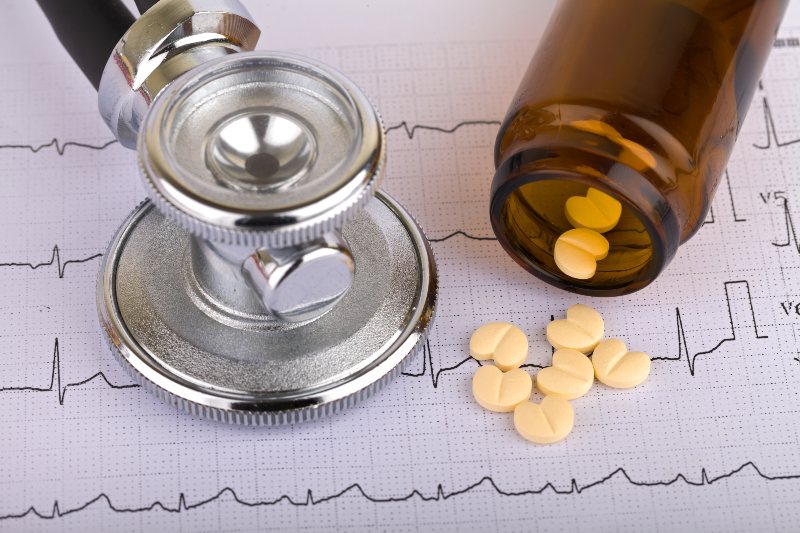Hypertension or high blood pressure is a common medical condition when the blood pressure of the body soars above the 130/80 mmHg mark in mercury levels. High blood pressure causes the narrowing of the blood vessels, making it difficult for the heart to pump blood through our body, thus risking severe damage to vital organs like the heart, brain, eyes, and kidneys. It affects up to 40% of people over the age of 25 worldwide. Yet, it is not easy to detect, which is why it is sometimes called the “silent killer.”
In fact, one-third of all hypertension cases in the world go unnoticed. High blood pressure symptoms include headaches, nosebleeds, dizziness, chest pain, shortness of breath, and blood in urine, amongst others. But, since these high bp symptoms develop over a period of time, and even then, may be attributed to other issues, they are often overlooked as routine health problems. Therefore, to administer treatment for high blood pressure, it is important that the disease is detected early. Recent scientific findings indicate that early signs of hypertension can also be detected in the mouth. In this blog, we will discuss how to avoid high blood pressure by paying close attention to oral hygiene.
Read more about the hidden link between high blood pressure and oral health.
What You Need To Know:
- Hypertension and oral health
- The link between hypertension and dental health
- How to treat hypertension?
- How to treat hypertension?
Hypertension And Oral Health

It is often said that most high blood pressure cases are detected during a visit to the doctor. Since blood pressure screening is a vital process at the dentist’s clinic, suffering from oral ailments also warrants close blood pressure monitoring. A report from the Hypertension Journal reveals that poor oral health often intervenes in high blood pressure treatment.
A study on 3600 patients with hypertension revealed that those with healthier gums have lower blood pressure and responded better to blood pressure-lowering medications. On the contrary, hypertension patients with gum diseases were 20% less likely to benefit from high blood pressure treatment. People with underlying oral problems are more likely to suffer from cardiovascular diseases as inflammation inside blood vessels thickens their lining, which results in a decrease in blood flow and an increased risk of a heart attack.
The link between hypertension and dental health
A clinical study published in the Journal of Oral and Maxillofacial Pathology suggested a more direct link between oral health and high blood pressure. It suggests that the mouth is an ideal breeding area for bacteria and germs that often enter the bloodstream through infected oral tissue.
In a sample size of 465 known hypertensive patients across all genders, ages, and social backgrounds, almost 80% showed signs of bleeding gums, dry mouth, swelling in gums, lining in irritation in the lining of the cheeks. The study concluded that even though it cannot be determined whether the oral ailments were caused by hypertension, there is a direct association between hypertension and periodontal pathology, that is, oral diseases.
High blood pressure treatment

High blood pressure treatment can include various measures to attain desired results. If you are suffering from Type 1 hypertension, your blood pressure range is between 130–139. In that case, you can simply adopt better lifestyle changes like dietary improvements, balancing weight, managing stress, and quitting smoking as well as alcohol consumption. A high blood pressure diet includes more fruits, whole grains, lean protein like fish, leafy vegetables, and less meat.
How to treat hypertension?
Developing a clean and healthy oral regime is also highly recommended, as whatever is going on in your mouth is going through your body and your bloodstream. If you have a history of cardiovascular diseases in the family, analyzing your oral hygiene and regular check-ups with the dentist can help. However, if you are suffering from Type 2 blood pressure or a hypertensive crisis, these lifestyle changes must be accompanied by medication. Of course, proper consultation with the doctor is advisable before introducing any major changes to your lifestyle or medication. A healthy mouth is a secret to a healthy heart and a fit body. So if you want to detect high blood pressure, pay close attention to your oral health. Better yet, ensure regular visits to your dentist, floss your teeth, and strengthen your gums to avoid hypertension at all.
Get a Day 1 cover for chronic heart diseases like Diabetes, High Blood Pressure, Cholesterol, and Asthma with the Activ Health – Platinum Enhanced Plan. It is a Health Insurance plan that covers costs for tests and diagnostics too. Get access to expert health coaches for coaching on nutrition, fitness and mental health with mental wellness counselling, homeopathy, and teleconsultation, #ABHIKaro.
Be a part of the Activ Living Community for more tips on mindfulness and fitness.
Popular Searches
Natural Beta blockers | How to cure depression | Summer activities for kids | High bp symptoms | HIIT workout | How to increase platelet count | Dash diet | Systolic and diastolic blood pressure | High blood sugar symptoms | Tabata workout | Push ups for beginners | Benefits of zumba | How to prevent breast cancer | Homeopathic medicine for asthma | Fruits to avoid in pcos | Neck pain relief exercises |Yoga for heart | Healthy soup recipes | Anti aging foods | Vitamin rich foods





 1800-270-7000
1800-270-7000





